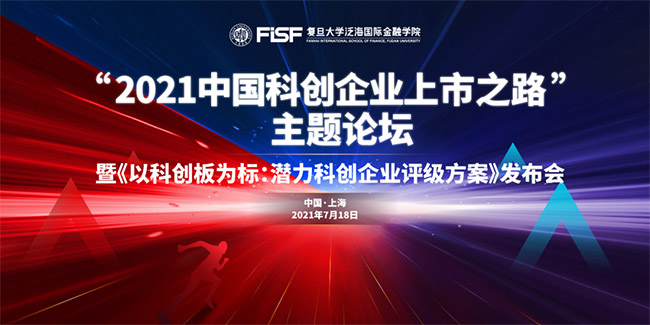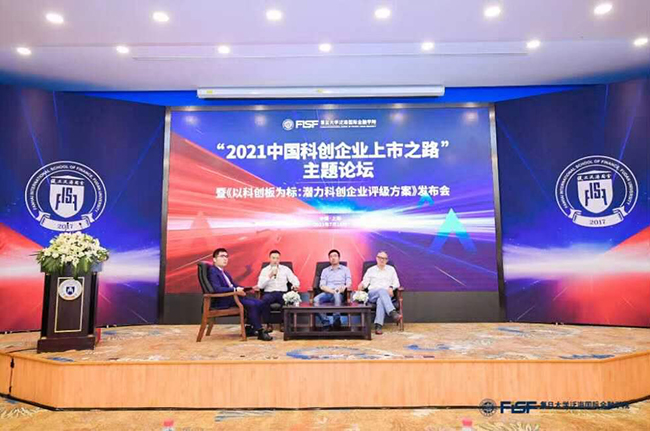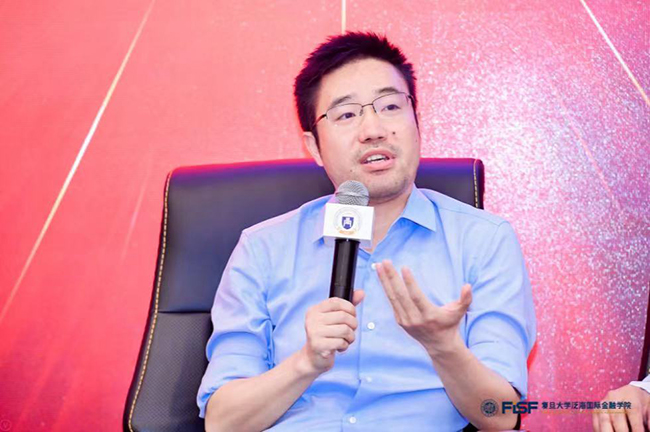
-
 86-21-63895588
86-21-63895588
-
 No.1, Lane 600, Nanchezhan Road, Huangpu District, Shanghai 200011
No.1, Lane 600, Nanchezhan Road, Huangpu District, Shanghai 200011
Release time:2021-07-22

At the 2nd anniversary of the launch of the STAR Market, China’s capital market has entered a whole new historical stage and the STAR Market will continue to show its exemplary effects in supporting hardcore technology. On July 18th 2021, the theme forum of “2021 Ways of Listing for China’s Sci-tech Enterprises” was successfully held, gathering distinguished guests from government units, university thinktanks, sci-tech enterprises, industrial parks and press media to have in-depth discussions on the achievements and experience acquired by the reform of the pilot registration system on the STAR Market in the two years and to actively explore the ways of listing for China’s potential sci-tech enterprises.
In the round-table dialogue of the forum, Mr. Yongwei Li, Co-head of Huatai United Securities Shanghai Department, Mr. Le Lin, Founder and CEO of Shanghai Neng Lian Technology Co., Ltd (Neng Lian Technology), Mr. Yuanjie Xu, Senior Internet Marketing Expert, Former CEO of China.com and Former COO of Baihe.com, and other guests conducted fierce discussion on the topic of “boosting China’s technology development with the STAR Market - the new ecosystem in the capital market under the reform of the registration system”. Professor Huasheng Gao, Deputy Dean of Faculty and Research, hosted the round-table dialogue.

Mr. Yongwei Li stated that the IPO transformation from the approval system to the registration system brought three key changes to securities business. Firstly, the institutional supply side reform of the pilot registration system on the STAR Market loosened the listing standards for high-quality enterprises not yet profitable or red-chip structural enterprises, and the range of potential customers for financial institutions like securities companies and investment banks is also broadened. Secondly, in the specific listing process, the registration system taking information disclosure as the core is more tolerant toward the regulations and restrictions compared to the approval system where merit regulation is carried out. Thirdly, the price/earnings ratio on the STAR Market is higher than the Main Board. With the follow-up investment system of securities traders, they focus on not just the listing status of an enterprise, but whether it has core technology and a development prospect in the long run.

Mr. Le Lin Held that sci-tech enterprises act as value producers and manufacturers, while investment banks or financial institutions are value excavators and discoverers. However, there actually exists a cognitive gap of value between value manufacturing and value excavating. From the perspective of the capital market, enterprises apply a set of financial language and another set of language to meet the listing requirements; and from the perspective of technological innovation, sci-tech enterprises have their own set of industry creating language. Both the industrial language and the capital language pursue the unification of capitalization through financial statements, but the development logic behind each financial statement vary greatly. Lin hoped investment banks or financial institutions can serve as the bridge to help enterprises cross the cognitive gap between value manufacturing and value excavating.

Mr. Yuanjie Xu vividly analyzed how to successfully match high-quality sci-tech enterprises to the capital market from the perspective of Internet marketing. He claimed that investment institutions evaluate enterprises in multiple aspects, including both rational research and sensitive cognition. But the three factors are always the most important: the first is the racetrack, which is the biggest part for investors; the second is the company, not just its turnover and profit but its prospect expectation; the third is its uniqueness. Whether the business barrier is strong enough, whether the racetrack ranks high and whether the enterprise is growing high enough, all these three factors will determine the judgment of the capital market on the value of the enterprise.

Professor Huasheng Gao concluded in the round-table dialogue that full competition is a good thing in the future either for the capital market or the industrial market. Even with the widespread nature of the registration system, each board of the capital market will still vary in orientation, and different board markets like the Main-board Market, the STAR Market and the Second-board Market will also grow differently. Despite the same system, they each have their own properties and preferences. For enterprises, each will also choose to list on the suitable board market. The comprehensive advancement of the registration system will further deepen the reform of the capital market.

On this forum, With STAR Market as Standard: Rating Scheme of Potential Sci-tech Enterprises led by Professor Jun Qian, Executive Dean of FISF, was initially released. Based on the analysis framework of relevant fields of company finance, capital market and company governance and in combination of the features of China’s capital market and the reform of the registration system, the scheme screens and excavates potential sci-tech enterprises through rigorous statistics and econometric analysis and makes an overall assessment on the gap between these potential sci-tech enterprises with those already listed on the STAR Market so that a relatively comprehensive evaluation result and improvement direction can be offered for the future development and strength increase of these potential enterprises.
Mr. Le Lin highly affirmed the rating scheme. The assessment system of the scheme is very professional and unique, which can provide effective reference and correct guidance for sci-tech enterprises planning to be listed in order to help them realize the problems and deficiencies existing in their development and thus achieve faster and better development.
Mr. Yuanjie Xu believed that this rating scheme is of significant and positive meanings to the reform of the entire capital market, especially the reform of the pilot registration system. It can help the market accumulate and precipitate a number of growth sci-tech enterprises that are strong and willing to go public.
Mr. Zhuping Du, Deputy Director of Changzhou National Hi-tech District Industrial Development Zone (Xinbei District) Economic Development Bureau and Director of Local Financial Supervision and Administration Bureau, stated that the rating system can effective sort out the development situation of enterprises in the Industrial Park, and can largely help the government of the park better serve the enterprises in the region, especially by providing more targeted listing guidance for enterprises in the park that plan to go public.